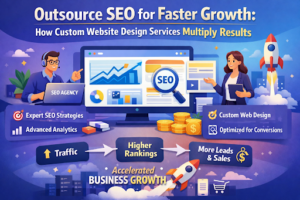Enterprise Artificial Intelligence (AI) is a transformative force that empowers organizations to leverage advanced technology to make data-driven decisions, streamline operations, enhance customer experiences, and gain a competitive edge. In this article, we will explore the key components of enterprise AI, the challenges it presents, and the solutions that can help organizations harness its full potential.
Components of Enterprise AI:
Data Collection and Integration:
The foundation of enterprise AI lies in data. Organizations must collect, store, and integrate data from various sources, including structured and unstructured data. This process involves data cleansing, normalization, and data pipeline creation to ensure that the data is accurate and ready for analysis.
Machine Learning Algorithms:
Machine learning is a fundamental component of enterprise AI. Machine learning solutions encompasses a wide range of algorithms that enable the system to learn from data, make predictions, and automate decision-making processes. Common algorithms include regression, decision trees, support vector machines, and deep learning neural networks.
Natural Language Processing (NLP):
NLP allows AI systems to understand and interact with human language. It’s crucial for applications like chatbots, sentiment analysis, and language translation, enabling organizations to provide efficient customer support and gain insights from textual data.
Computer Vision:
Computer vision technology enables AI systems to interpret and analyze visual information from images and videos. This component is invaluable in industries like healthcare (medical imaging), manufacturing (quality control), and retail (visual search).
Predictive Analytics:
Predictive analytics uses historical and real-time data to forecast future trends, behaviors, and events. This is vital for optimizing resource allocation, inventory management, and demand forecasting.
Challenges in Implementing Enterprise AI:
Data Quality and Availability:
One of the most significant challenges in enterprise AI solutions is ensuring data quality and availability. Incomplete, inconsistent, or biased data can lead to inaccurate AI model predictions. Organizations need to invest in data quality initiatives and data governance to address these issues.
Scalability:
As data volumes grow, AI systems need to scale accordingly. This presents challenges in terms of infrastructure, processing power, and maintaining model performance. Cloud-based solutions and edge computing can help address these scalability issues.
Ethical and Regulatory Concerns:
AI systems can inadvertently perpetuate biases and discrimination present in the training data. To address ethical concerns, organizations must implement fairness and transparency measures, adhere to regulations like GDPR and HIPAA, and prioritize ethical AI development.
Skill Gap:
There is a shortage of AI talent in the job market. Organizations must invest in training and reskilling their workforce to bridge the skill gap and effectively use AI technology.
Integration with Legacy Systems:
Many organizations have legacy IT systems that are not AI-ready. Integrating AI into these systems can be complex and expensive. Hybrid solutions and API-based integrations can help bridge the gap between legacy and modern AI systems.
Solutions for Enterprise AI Challenges:
Data Governance and Quality Control:
Implement strong data governance practices, ensuring data is clean, accurate, and compliant with privacy regulations.
AI as a Service:
Consider using AI platforms and solutions provided by cloud providers to reduce the cost and complexity of building and maintaining AI infrastructure.
Skill Development:
Invest in training programs for existing employees or partner with educational institutions to develop a pipeline of AI talent.
Interoperability Solutions:
Utilize API integration and middleware to connect AI systems with legacy applications and databases.
Cost Management:
Carefully assess the ROI of AI initiatives and explore open-source AI frameworks and tools to reduce development costs.
Ethical AI Frameworks:
Develop and adhere to ethical AI principles, including transparent decision-making processes and bias mitigation.
Use Cases of Enterprise AI:
Customer Service: Chatbots and virtual assistants powered by AI are used to provide 24/7 customer support, answer queries, and assist in issue resolution.
Predictive Maintenance: Industries such as manufacturing and utilities use AI to predict when equipment is likely to fail, enabling proactive maintenance.
Sales and Marketing: AI-driven analytics can provide insights into customer behavior, allowing for more targeted marketing campaigns and personalized product recommendations.
Supply Chain Optimization: AI can optimize inventory management, demand forecasting, and logistics, reducing costs and improving efficiency.
Financial Services: AI is used for fraud detection, risk assessment, and algorithmic trading in the financial industry.
Healthcare: Enterprise AI is employed for medical image analysis, patient data management, and drug discovery.
Conclusion:
Enterprise AI is a powerful tool that can revolutionize the way organizations operate, innovate, and serve their customers. Its components, including data integration, machine learning algorithms, NLP, computer vision, and predictive analytics, can unlock valuable insights and efficiencies. However, challenges related to data quality, scalability, ethics, skills, and legacy system integration must be carefully addressed. By implementing the suggested solutions, organizations can navigate these challenges and harness the full potential of enterprise AI, gaining a competitive edge in an increasingly data-driven world.





